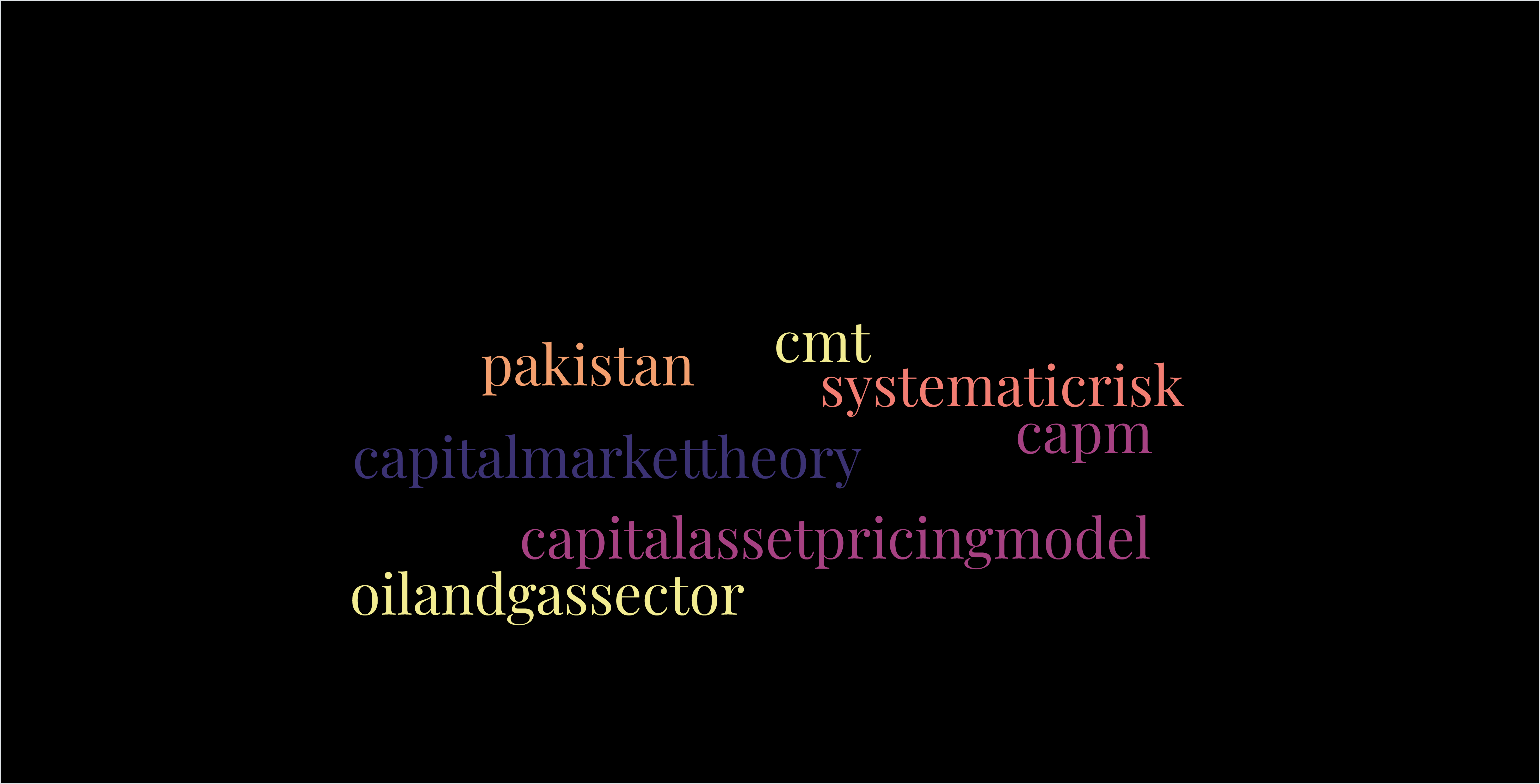Determinants Affecting Systematic Risk in Pakistan’s Oil and Gas Sector
Abstract
 Abstract Views: 0
Abstract Views: 0
The current study aimed to investigate the effect of different determinants on systematic risk in Pakistan’s oil and gas sector. In this study, the data of six systematic risk determinants, namely liquidity, firm size, operating efficiency, profitability, growth, and leverage, was collected from Pakistan Stock Exchange (PSX). Moreover, the firm’s monthly stock return and Karachi Stock Exchange (KSE) 100 index return data for the period of 2018-2022 was obtained from the website of ZHV Securities. Random effect regression analysis was performed to test hypothesis based on the Hausman test to validate the absence of multicollinearity, heteroskedasticity, and serial autocorrelation. Regression results showed that liquidity, profitability, operating efficiency, and leverage had a negative and significant effect. On the other hand, size and growth had a negative but insignificant effect on systematic risk regarding oil and gas companies in Pakistan. The obtained results were consistent with the existing literature and Capital Market Theory (CMT) and Capital Asset Pricing Model (CAPM). Policymakers are recommended to consider implementing measures in order to improve access to finance for companies in the sector, improve operational efficiency, and diversify sources of financing. Furthermore, the researchers are recommended to conduct comparative studies between different sectors to provide more valuable insights considering other determinants as per their country, industry, and sector dynamics.
Downloads
References
Adekoya, O., Oliyide, J., Akinseye, A., & Al-Faryan, M. A. S. (2024). Risk spillovers among global oil & gas firms. Investment Analysts Journal, 54, 1–19. https://doi.org/10.1080/10293523.2024.2347714
Alam, S. M. I. (2022). The capital market theory: Markowitz, cml, and separation theorem. https://www.researchgate.net/publication/363639593_The_Capital_Market_Theory_Markowitz_CML_and_Separation_Theorem
Alrwashdeh, N. N. F., Ahmed, R., Danish, M. H., & Shah, Q. (2023). Assessing the factors affecting the liquidity risk in Jordanian commercial banks: A panel data analysis. International Journal of Business Continuity and Risk Management, 13(1), 84–99. https://doi.org/10.1504/IJBCRM.2023.10055478
Alrwashdeh, N. N. F., Umara, N., Hassan, D. M., & and Ahmed, R. (2024). Bank capital and risk in emerging banking of Jordan: A simultaneous approach. Cogent Economics & Finance, 12(1), Article e2322889. https://doi.org/10.1080/23322039.2024.2322889
Alsagr, N., & Van Hemmen, S. (2021). The impact of financial development and geopolitical risk on renewable energy consumption: Evidence from emerging markets. Environmental Science and Pollution Research, 28, 25906–25919. https://doi.org/10.1007/s11356-021-12447-2
Arezki, M. R., Jakab, Z., Laxton, M. D., Matsumoto, M. A., Nurbekyan, A., Wang, H., & Yao, J. (2017). Oil prices and the global economy. International Monetary Fund. https://www.imf.org/en/Publications/WP/Issues/2017/01/27/Oil-Prices-and-the-Global-Economy-44594
Arora, L. (2019, June 21–23). Firm performance and systematic risk [Paper presentation]. 2nd International Conference on Business, Management and Economics, Vienna, Austria.
Bratis, T., Laopodis, N. T., & Kouretas, G. P. (2020). Systemic risk and financial stability dynamics during the Eurozone debt crisis. Journal of Financial Stability, 47, Article e100723. https://doi.org/10.1016/j.jfs.2020.100723
Cincinelli, P., Pellini, E., & Urga, G. (2021). Leverage and systemic risk pro-cyclicality in the Chinese financial system. International Review of Financial Analysis, 78, Article e101895. https://doi.org/10.1016/j.irfa.2021.101895
Dai, Z., & Wu, T. (2024). The impact of oil shocks on systemic risk of the commodity markets. Journal of Systems Science and Complexity, 37, 2697–2720. https://doi.org/10.1007/s11424-024-3224-y
Durrani, O., & Zeeshan, Q. (2023). An assessment of risks in oil and gas construction projects in Pakistan: A quantitative approach using failure modes & effects analysis. Journal of Engineering Management and Systems Engineering, 2(3), 180–195. https://doi.org/10.56578/jemse020305
El Tamamy, M. (2014). Investigating the explanatory power of economic profits (Eva®) versus accounting profits on stock returns as a measure of shareholders wealth creation. An empirical study of the FTSE 100. An Empirical Study of the FTSE, 100 [Master’s thesis, London School of Business and Finance]. Social Science Research Network. https://dx.doi.org/10.2139/ssrn.2507191
Hausman, J. A. (1978). Specification tests in econometrics. Econometrica: Journal of the Econometric Society, 46(6), 1251–1271. https://doi.org/10.2307/1913827
Hassan, M. S. (2023). Dynamics of corporate governance and tax avoidance in Pakistan family-owned firms. KASBIT Business Journal, 16(4), 1–13.
Hassan, M. S., Ahmad, A., & Qadeer, A. (2022). Dynamics of intellectual capital, corporate governance, and firm performance in family-owned companies in Pakistan. NUML International Journal of Business & Management, 17(2), 1–17. https://doi.org/10.52015/nijbm.v17i2.133
Islam, S., Raihan, A., Ridwan, M., Rahman, M. S., Paul, A., Karmakar, S., Paul, P., Tanchangya, T., Rahman, J., & Al Jubayed, A. (2023). The influences of financial development, economic growth, energy price, and foreign direct investment on renewable energy consumption in the BRICS. Journal of Environmental and Energy Economics, 2(2), 17–28. https://doi.org/10.56946/jeee.v2i2.419
Jaafar, M. N., Muhamat, A. A., Basri, M. F., & Alwi, S. F. S. (2020). Determinants of systematic risk: Empirical evidence from Shariah compliants firms listed on Bursa Malaysia. International Business Education Journal, 13(1), 71–82. https://doi.org/10.37134/ibej.vol13.1.6.2020
Jiayi, L. (2016). Systematic risk, financial indicators and the financial crisis: A risk study on international airlines [Unpublished master's thesis]. Uppsala University.
Kamran, M., & Malik, Q. (2018). Do financial variables affect the systematic risk in sugar industry? Pakistan Administrative Review, 2(2), 234–242.
Kraidi, L., Shah, R., Matipa, W., & Borthwick, F. (2019). Analyzing the critical risk factors associated with oil and gas pipeline projects in Iraq. International Journal of Critical Infrastructure Protection, 24, 14–22. https://doi.org/10.1016/j.ijcip.2018.10.010
Lasmana, S. A., & Wahyudin, A. (2021). Profitability as a moderating variable of systematic risk in mining companies. Accounting Analysis Journal, 10(2), 131–137. https://doi.org/10.15294/aaj.v10i2.47343
Liu, J. H., Huang, L.-L., & McFedries, C. (2008). Cross-sectional and longitudinal differences in social dominance orientation and right wing authoritarianism as a function of political power and societal change. Asian Journal of Social Psychology, 11(2), 116–126. https://doi.org/10.1111/j.1467-839X.2008.00249.x
Maghyereh, A., & Abdoh, H. (2020). Asymmetric effects of oil price uncertainty on corporate investment. Energy Economics, 86, Article e104622. https://doi.org/10.1016/j.eneco.2019.104622
Maiti, M. (2021). Efficient frontier and portfolio optimization. In M. Maiti (Ed.), Applied financial econometrics: Theory, method and applications (pp. 89–111). https://doi.org/10.1007/978-981-16-4063-6_4
Mittal, S., Bhattacharya, S., & Mandal, S. (2022). Characteristics analysis of behavioural portfolio theory in the Markowitz portfolio theory framework. Managerial Finance, 48(2), 277–288. https://doi.org/10.1108/MF-05-2021-0208
Muhammad, B., Khan, M. K., Khan, M. I., & Khan, S. (2021). Impact of foreign direct investment, natural resources, renewable energy consumption, and economic growth on environmental degradation: Evidence from BRICS, developing, developed and global countries. Environmental Science and Pollution Research, 28(17), 21789–21798. https://doi.org/10.1007/s11356-020-12084-1
Nahar, N., Alrwashdeh, N., Ahmed, R., Danish, M., & Shah, Q. (2023). Assessing the factors affecting the liquidity risk in Jordanian commercial banks: A panel data analysis. International Journal of Business Continuity and Risk Management, 13(1), 84–99. https://doi.org/10.1504/IJBCRM.2023.10055478
Narayan, S., Le, T.-H., Rath, B. N., & Doytch, N. (2019). Petroleum consumption and economic growth relationship: Evidence from the Indian States. Asia-Pacific Sustainable Development Journal, 26(1), 21–65. https://doi.org/10.18356/348f0f5e-en
Nawaz, R., Imran, S., Arshad, M., Rani, T., & Khan, A. (2017). Financial variables and systematic risk. Chinese Business Review, 16(1), 36–46. https://doi.org/10.17265/1537-1506/2017.01.004
Nguyen, T. C., Vu, T. N., Vo, D. H., & McAleer, M. (2020). Systematic risk at the industry level: A case study of Australia. Risks, 8(2), Article e36. https://doi.org/10.3390/risks8020036
Nugroho, M., & Halik, A. (2021). The effect of growth and systematic risk on the firm’s value: Profitability as a mediating variable. Journal of Economics, Business, & Accountancy Ventura, 23(3), 466–476. https://doi.org/10.14414/jebav.v23i3.2468
Pagano, M. S., & Sedunov, J. (2016). A comprehensive approach to measuring the relation between systemic risk exposure and sovereign debt. Journal of Financial Stability, 23, 62–78. https://doi.org/10.1016/j.jfs.2016.02.001
Quint, D., & Venditti, F. (2023). The influence of OPEC+ on oil prices: A quantitative assessment. The Energy Journal, 44(5), 173–186.
Shafique, A., Hassan, M. U., Shahzad, A., Ali, Q. M., & Saqlain, M. (2022). Exchange rate volatility and its relationship with macroeconomic variables in Pakistan. Bulletin of Business and Economics (BBE), 11(1), 121–131.
Sukrianingrum, D. R., & Manda, G. S. (2020). The effect of systematic risk and unsystematic risk on expected return of optimal portfolio. SAR (Soedirman Accounting Review): Journal of Accounting and Business, 5(2), 181–195. https://doi.org/10.20884/1.sar.2020.5.2.3772
Tache, I. (2024). OPEC and the 1970s oil crises: Lessons for the 2021 global energy crisis. In H.-D. Yan, O. Bajo-Rubio, D. S. Kwan, & F.-L. T. Yu (Eds.), Conflicts and challenges in the middle east: religious, political and economic perspectives (pp. 61–77). Springer.
Wang, Y., Bouri, E., Fareed, Z., & Dai, Y. (2022). Geopolitical risk and the systemic risk in the commodity markets under the war in Ukraine. Finance Research Letters, 49, Article e103066. https://doi.org/10.1016/j.frl.2022.103066
Wiyono, E. R., & Mardijuwono, A. W. (2020). Leverage, profitability, firm size, exchange rate, and systematic risk: Evidence from the manufacturing industry in Indonesia. Cuadernos de Economía, 43, 442–448. https://doi.org/10.32826//cude.v4i123.402
Yang, L., Wang, Y., Wang, R., Klemeš, J. J., Almeida, C. M. V. B. d., Jin, M., Zheng, X., & Qiao, Y. (2020). Environmental-social-economic footprints of consumption and trade in the Asia-Pacific region. Nature Communications, 11(1), Article e4490. https://doi.org/10.1038/s41467-020-18338-3
Zaman, S. u. (2023). Arab oil embargo. In M. Ustaoğlu & C. Çakmak (Eds.), The palgrave encyclopedia of islamic finance and economics (pp. 1–8). springer.
Zhao, X.-h., & Zhang, Z.-h. (2020). Risk factors for postpartum depression: An evidence-based systematic review of systematic reviews and meta-analyses. Asian Journal of Psychiatry, 53, Article e102353. https://doi.org/10.1016/j.ajp.2020.102353

Copyright (c) 2025 Muhammad Shoaib Hassan, Gul Mehak, Waqas Mehmood

This work is licensed under a Creative Commons Attribution 4.0 International License.
Authors retain copyright and grant the journal right of first publication with the work simultaneously licensed under a Creative Commons Attribution (CC-BY) 4.0 License that allows others to share the work with an acknowledgement of the work’s authorship and initial publication in this journal.






